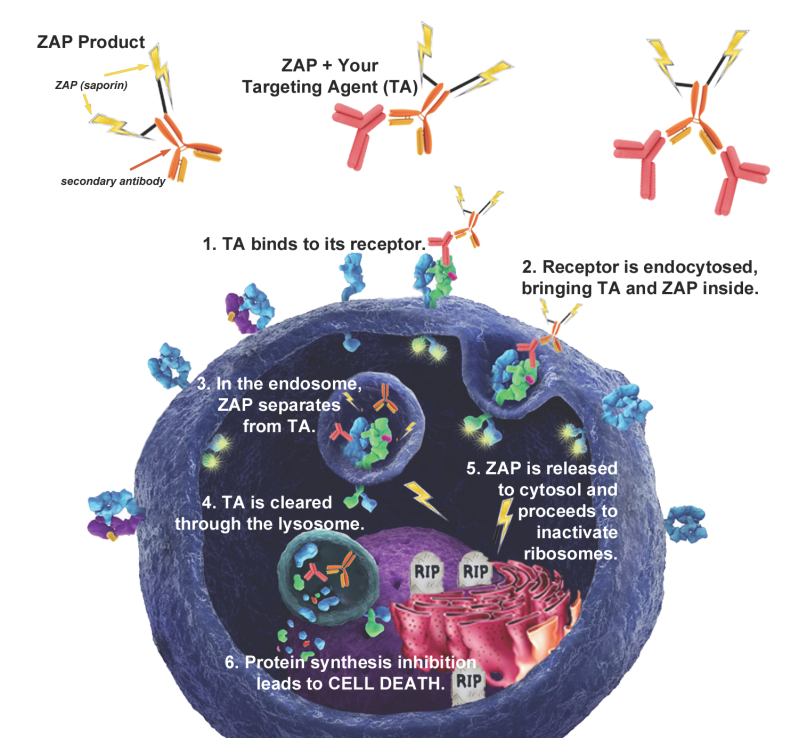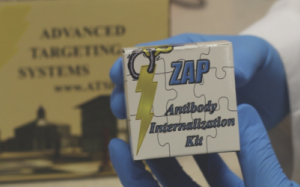Screening large numbers of antibodies for the ability to internalize can be prohibitively expensive in both cost and time. The ZAP Antibody Internalization Kit contains all the components needed for three 96-well plates, or 288 tests. The ability to perform a diagnostic screen that is amenable to high-throughput methods, prior to direct conjugation of those antibodies, is a great cost-benefit in the development of an effective targeted conjugate. Targeted conjugates are widely used to escort payloads to specific cell populations in vitro and in vivo for both basic research and pharmaceutical development. The development of an effective and specific targeted conjugate is a long and costly process. A molecule that targets the marker of choice (a Targeting Agent) must be identified and produced; internalization and specificity must be verified and characterized. Desirable traits of a Targeting Agent (TA) include high specificity and rapid internalization. The TA can be an antibody, peptide, protein, or any other molecule that recognizes a cell-surface marker. Antibodies often make the best targeting agents, and the choice of the correct antibody is crucial to the specificity and performance of payload delivery.
The ZAP products produced by Advanced Targeting Systems, Inc. allow a large number of antibodies to be screened quickly and cost-effectively for specificity, functional binding, internalization, and EC50 determination. The wide selection of these secondary conjugates identified by the ZAP moniker provide ideal tools for screening potential antibodies (Fig 1). They are constructed using either species-specific polyclonal anti-IgG antibodies, or streptavidin (alternate kit for use with biotinylated targeting agents), that are chemically attached to Saporin, the most potent of the plant ribosome-inactivating proteins. The mechanism of action of ZAP-based conjugates is detailed in Fig 2.
Use of a ZAP conjugate eliminates the time-consuming and expensive step of conjugating each TA candidate to the payload: the ZAP product can simply be added to cells together with the TA candidate. Once the materials have been administered, the antibody directs the ZAP to the cells of interest, the complex is bound by the targeted cells, internalized, and the Saporin protein is released within the cytosol to inactivate the ribosomes. Cells not expressing the target do not bind or internalize the ZAP-antibody complex, and are not affected. Saporin has no binding chain, and no means of getting into cells on its own.
The ZAP Antibody Internalization Kit contains all of the materials needed to screen your antibody. Included, in addition to the selected ZAP products, are controls and developing reagents for the assay. All the user provides are the materials specific to their experiment (the antibody candidate, cells expressing the target, and culture reagents). Recommended protocols for use are detailed in a booklet and on a flash drive provided, and are specific to the particular kit chosen (Whole-ZAP, Fab-ZAP, or FabFc-ZAP). Examples of predicted assay results are also included for comparison; a successful assay provides an EC50 useful in determining if the candidate-antibody should be pursued at the next level.



